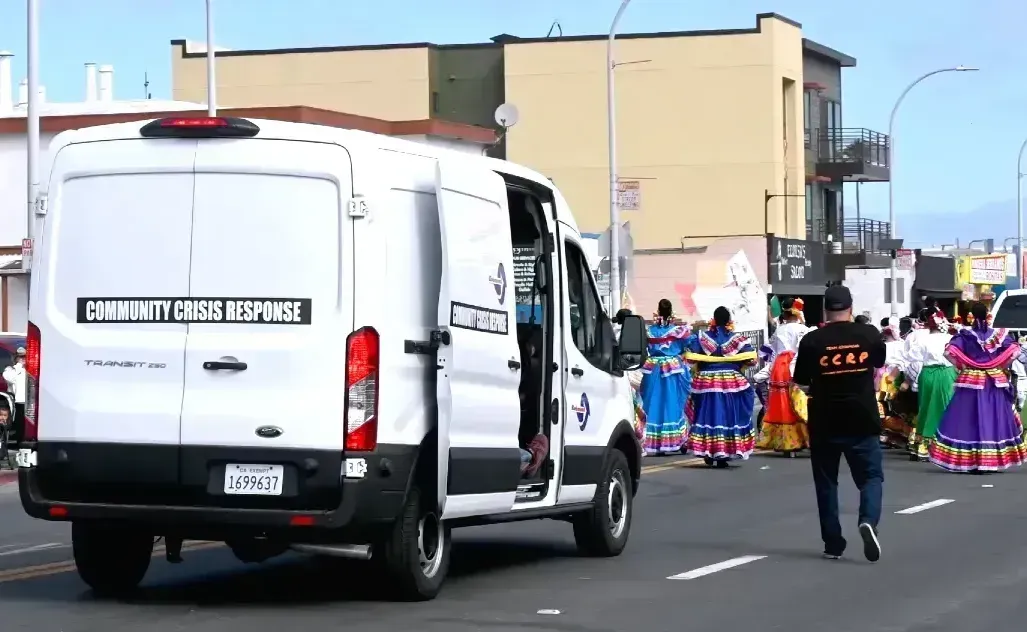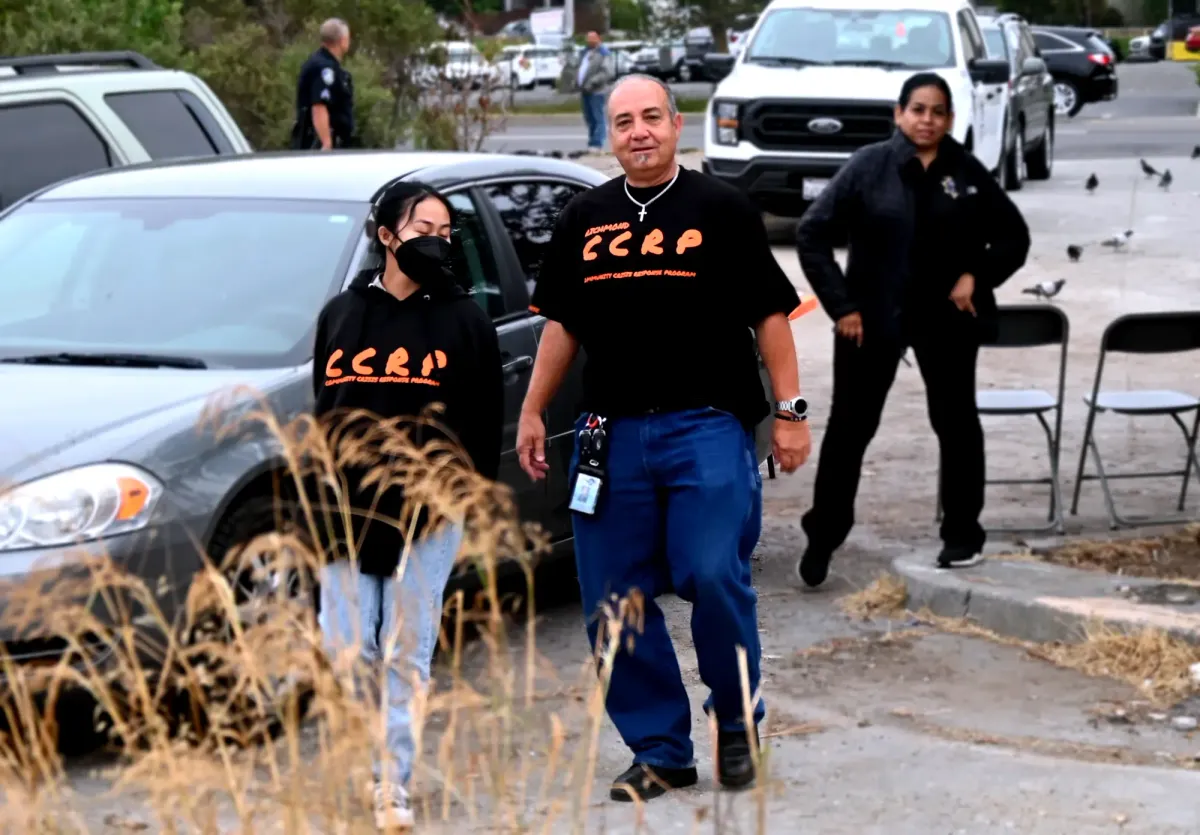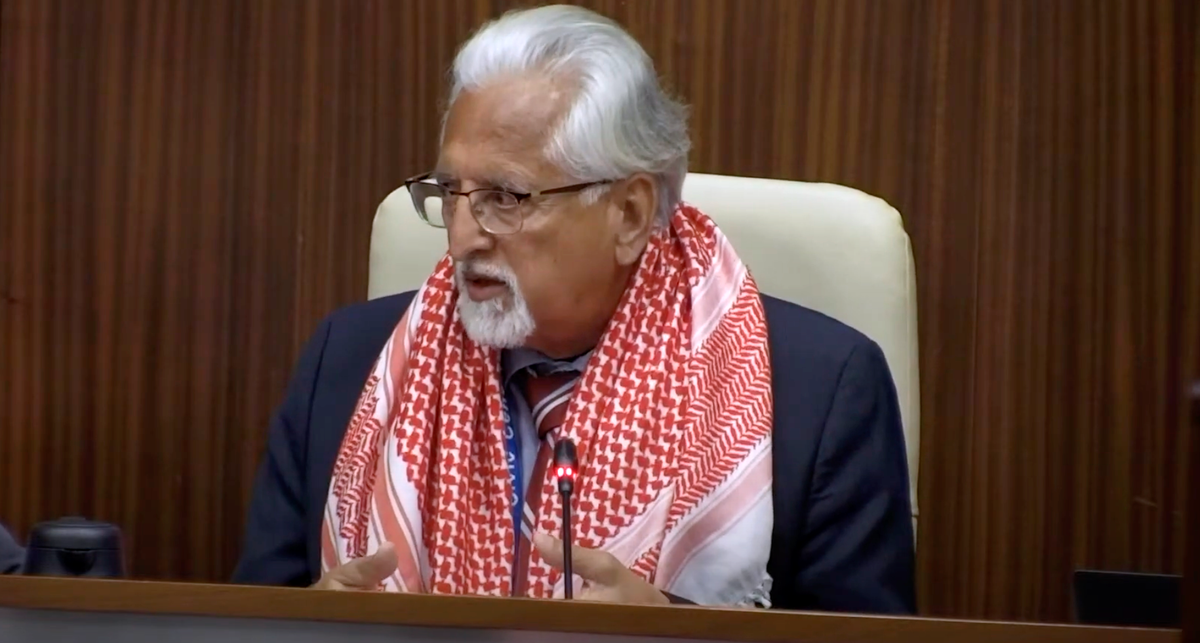

Richmond’s efforts to reshape public safety, tackle mounting pension debt, and address long-standing infrastructure woes are set to converge at Tuesday, April 15 meeting where a union dispute over the city’s community crisis response program, a $392 million pension liability, and the future of flood-prone Parchester Village will take center stage.
Richmond’s ROCK and a hard place
A simmering labor dispute over the city’s plan to expand community-based crisis response services will come to a head on Tuesday at city hall, where councilmembers are expected to decide which union will represent a new class of workers: Community Intervention Specialists.
The Richmond Police Officers Association (RPOA) is appealing a decision by the city’s Human Resources Department to assign the new role to SEIU Local 1021, the city’s general employees union. The position is part of the city’s Community Crisis Response Program ROCK (Reach Out with Compassion and Kindness), which aims to redirect certain non-violent, low-level emergency calls away from traditional police response.
 Grandview IndependentSoren Hemmila
Grandview IndependentSoren Hemmila
The city’s Personnel Board approved the classification in March 2024, but not without objections from the RPOA. The union argues that the role duplicates duties currently performed by police officers and should, therefore, be represented by RPOA.
“This unit is taking work directly from the RPOA,” RPOA attorney Jonathan Murphy wrote in a February 2025 letter to Human Resources Director Sharrone Taylor. “There is no other bargaining unit… representing members with even remotely similar job functions and requirements.”
Taylor disagreed. In a January 27 email, she wrote that the classification “has a more compelling community of interest with the city’s general employees bargaining unit than with the Police Officers’ Association.” She noted that the role mirrors work done by Neighborhood Change Agents and Code Enforcement Officers — both non-sworn classifications represented by SEIU.
The Community Intervention Specialist role is part of a broader shift in how Richmond responds to mental health crises, homelessness, and other social issues. The city said the CCRP was designed to “reduce reliance on police and criminal justice responses by offering a public health response.” Specialists would respond to low-level emergency and non-emergency calls, conduct risk assessments, provide referrals, and use de-escalation techniques.
District 6 Councilmember Claudia Jimenez, the primary champion of Richmond’s police budget reallocation efforts, said the police union is preventing the hiring of eight community responders.
“The RPOA’s resistance to this program is deeply concerning, especially considering the program’s potential to benefit our entire community,” Jimenez said. “I am deeply disappointed in the efforts by the RPOA to stall and try to prevent this program from being fully implemented.”
Also on the agenda is adopting the salary schedule for the community intervention specialist.
Salary would start at $78,220.56 and grow to $95,077.20 in the fifth step. Richmond police officers can earn between $118,824 and $159,468 per year, according to the department’s recruiting website.
CalPERS Conundrum: Richmond’s $392 million pension debt
NHA Advisors, the city’s municipal advisor, will provide more information about the options to pay down the city’s $392 million in unfunded pension liabilities now that the general fund will have extra funds due to the $550 million Chevron tax settlement.
In March, a union researcher gave a presentation claiming that the early payment plan could save taxpayers $117 million in interest while freeing up $33 million annually for city services.
 Grandview IndependentSoren Hemmila
Grandview IndependentSoren Hemmila
City staff engaged NHA Advisors to compare options for funding the CalPERS Unfunded Actuarial Liabilities within the context of the city council's goals and priorities.
Richmond grapples with Parchester Village’s drainage crisis
Public Works will hold a study session to discuss the draft scope of the Parchester Village – Giant Highway Infrastructure Master Plan.
Parchester has long faced critical infrastructure issues, including inadequate drainage, poor pavement conditions, and limited pedestrian and bicycle access. These problems are particularly acute along the Giant Highway corridor, a vital route for residents and emergency services. Recent flooding during heavy rains and King Tides has further highlighted the urgency of upgrades, with preliminary estimates suggesting costs could range from $10 million to $50 million, depending on the solutions pursued.
 Grandview IndependentSoren Hemmila
Grandview IndependentSoren Hemmila
The study, funded by a $500,000 allocation from the city’s FY 2023–24 budget, will unfold in two phases. Phase I will focus on data collection, community engagement, and conceptual designs, while Phase II will advance selected projects to 30 percent design readiness. Priorities include drainage improvements, sidewalk infill, ADA-compliant upgrades, and a potential Class IV bikeway.
On the consent calendar
All items placed under the Consent Calendar are considered to be routine and noncontroversial.
Among the items is a resolution urging the California State Legislature to adopt Assembly Bill 91, the MENA Inclusion Act, which seeks to disaggregate demographic data for Middle Eastern and North African populations. Additionally, the council will consider a significant $1.17 million contract amendment with WestEd to continue evaluation services for the Richmond Fund for Children and Youth through 2028.
A $1.59 million grant acceptance from the Bay Area Air Quality Management District for the Port Division, alongside a $70,000 sole-source contract for office furniture for the Port Administration offices.
Congressman John Garamendi’s office will also secure a two-year lease for district space at Civic Center Plaza.
The Finance Department will present its January and February investment and cash balance reports, an update on the city’s investment policy, and request that the council adopt a revised investment policy.
The Fire Department seeks approval for $229,462 in Measure H funding from Contra Costa County Health Services.
Community services are set to expand with a $3,174 grant for library lending, a $500,000 workforce development grant for electrification training, and a $150,000 contract for tutoring services.
The Mayor’s Office has several reappointments on the agenda, including Sara Cantor and Jim Hite to the Richmond Rent Board, Kerby Lynch to the Economic Development Commission, and James “Jim” Becker to the Richmond Environmental Community and Investment Agreement (ECIA) Grant Review Ad Hoc Committee. Additionally, April 2025 will be proclaimed Sexual Assault Awareness Month.
Public Works is seeking approval for a $365,185 contract with Kearns & West to support the Keller Beach Sanitary Sewer Project, as well as $465,000 for emergency repairs to the Dornan Tunnel sewer line. A $2 million appropriation from the General Capital Fund will support the Point Molate Beach Stabilization Project, and a $360,000 sole-source contract with Vestis Group, Inc. for uniform rental and laundry services is also on the agenda.
Thanks to our subscribers, who help make this coverage possible.
If you are not a subscriber, please consider supporting local journalism with a Grandview Independent subscription. Click to see our monthly and annual subscription plans.
Copyright © 2025 Grandview Independent, all rights reserved.
